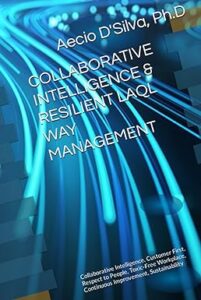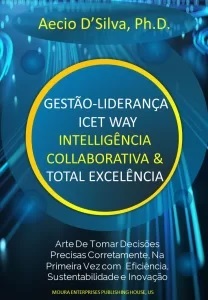Contents
- 1 Cultivating a Scientific Mindset for Problem Solving and Critical Thinking
- 2 Prof. Aécio D’Silva, Ph.D AquaUniversity
- 3 Think Like a Scientist – The Power of Curiosity and Questioning Assumptions
- 4 Think Like a Scientist – The Importance of Evidence and Data
- 5 Think Like a Scientist – Embracing Failure and the Iterative Process
Cultivating a Scientific Mindset for Problem Solving and Critical Thinking
Prof. Aécio D’Silva, Ph.D
AquaUniversity
Think Like a Scientist – In a world filled with ever-evolving challenges and a barrage of information, thinking critically and making rational decisions have become crucial skills. At the heart of this skill lies the essence of scientific thinking. While we may associate scientists with lab coats and beakers, the principles underlying their work extend far beyond the confines of a laboratory. By adopting a scientific mindset, we can harness the power of rational inquiry, enabling us to approach problems with a curious and evidence-based perspective. In this article, we explore how thinking like a scientist can transform the way we navigate our personal and professional lives, and how it can serve as a foundation for effective problem-solving and decision-making.
Think Like a Scientist – The Power of Curiosity and Questioning Assumptions
Curiosity is the driving force behind scientific inquiry. Scientists are naturally curious, always asking questions and challenging assumptions. Similarly, adopting a scientific mindset means embracing the unknown, questioning established beliefs, and seeking evidence to support or refute them. By cultivating curiosity and continuously questioning assumptions, we open ourselves to new perspectives, ideas, and possibilities. This approach fosters a deeper understanding of complex issues and facilitates innovative problem-solving.
When we adopt a curious mindset, we become proactive seekers of knowledge. Rather than accepting information at face value, we dig deeper, seeking evidence, and critically evaluating the validity of claims. By questioning assumptions and engaging in rigorous inquiry, we can separate fact from fiction, enabling us to make more informed decisions and avoid falling prey to misinformation or cognitive biases.
Think Like a Scientist – The Importance of Evidence and Data
At the core of scientific thinking lies the reliance on evidence and data. Scientists carefully collect, analyze, and interpret information to draw conclusions and make informed judgments. Adopting this approach in our daily lives allows us to base our decisions on facts rather than personal biases or unfounded beliefs. It encourages us to seek reliable sources of information, critically evaluate data, and avoid jumping to hasty conclusions.
We can better navigate our increasingly complex and interconnected world by emphasizing evidence-based decision-making. Whether it’s evaluating the effectiveness of a new medical treatment, assessing the impact of climate change, or making financial investments, reliance on evidence and data helps us make more rational choices. It empowers us to approach problems systematically, considering multiple perspectives and weighing the available evidence before arriving at a well-informed decision.
Think Like a Scientist – Embracing Failure and the Iterative Process
One of the fundamental aspects of scientific thinking is the recognition that failure is an inherent part of the learning process. Scientists understand that failed experiments and unsuccessful hypotheses are valuable opportunities for growth and discovery. Similarly, thinking like a scientist involves embracing failure and approaching challenges as iterative processes. It encourages us to learn from our mistakes, refine our approaches, and persistently seek solutions.
By reframing failure as a stepping stone to success, we can overcome fear and take calculated risks. Adopting an iterative mindset allows us to experiment, learn from our experiences, and adjust our strategies accordingly. Rather than being discouraged by setbacks, we can view them as valuable feedback, guiding us toward better outcomes. This resilience and adaptability are essential traits for problem-solving in all areas of life.
Thinking like a scientist goes beyond the realm of laboratories and research institutions. It is a mindset that empowers us to approach problems with curiosity, skepticism, and reliance on evidence. By cultivating a scientific mindset, we can make more informed decisions.
In conclusion, thinking like a scientist is not just for scientists. It’s a way of thinking that can help you make better decisions and solve problems more effectively. By developing a scientific mindset, you can learn to approach problems with an open mind, evaluate evidence objectively, and communicate your ideas more effectively.
– References:
(1) Think Like A Scientist | Phil Heron. https://philheron.com/think-like-a-scientist/ Accessed 5/15/2023.
(2) What Does it Mean to Think Like a Scientist – ZBiotics. https://zbiotics.com/blogs/journal/think-like-a-scientist Accessed 5/15/2023.
(3) How to Think Like a Scientist: A Crash Course | Cedars-Sinai. https://www.cedars-sinai.org/discoveries/how-to-think-like-a-scientist.html Accessed 5/15/2023.
(4) Why Thinking Like a Scientist Is Good for You – Greater Good. https://greatergood.berkeley.edu/article/item/why_thinking_like_a_scientist_is_good_for_you Accessed 5/15/2023.
(6) Think Like A Scientist – ScienceAtHome.org. https://tls.scienceathome.org/ Accessed 5/15/2023.






